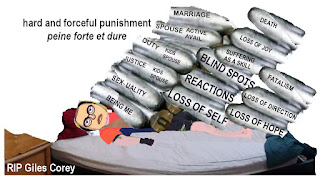Crushing Weight on the Chest : Me and Giles Corey
Giles Corey was charged with witchcraft. However, the State was quite uncertain that they had jurisdiction for several reasons and so they artfully would ask the accused to enter a plea of guilty or not-guilty; by entering a plea, the accused accepted the jurisdiction of the court. By "standing mute" and refusing to enter a plea, the accused rejected the court's jurisdiction and the trial could not continue.
Why did Giles Corey decline to enter a plea? If he pled and then was found guilty, his property would revert to the Crown. If he were never found guilty, his property would remain with his wife and heirs.
The courts had a remedy for this procedural disincentive: peine forte et dure, or "hard and forceful punishment" in which stones would be pressed upon the accused's chest, making it difficult for them to breathe. Eventually the accused would die of asphyxiation. In a perverse twist, when the accused embarked on this gambit the family would also add more rocks, or sit upon the rocks themselves, to hasten death and end the suffering.

As I, myself, lie awake at night I often feel as if I had a variety of weights on my chest, and I instantly felt some connection with Mr. Corey, who was a hard man. Whenever he was asked if he would submit a plea, he would ask: More weight, please, the sooner to end his suffering. It took him two days to succumb to the process, and he successfully kept his estate for his family.
On the suggestion of my therapist I made an image of what I felt like, lying in bed under the weights, and I labeled them:
I identified that the left-most column of weights were my initial complaints entering therapy, and the others were subsequent arrivals. My therapist suggested that the left-most column were my initial complaints, and the others were generated by not resolving the originals. He is often right about these things.
